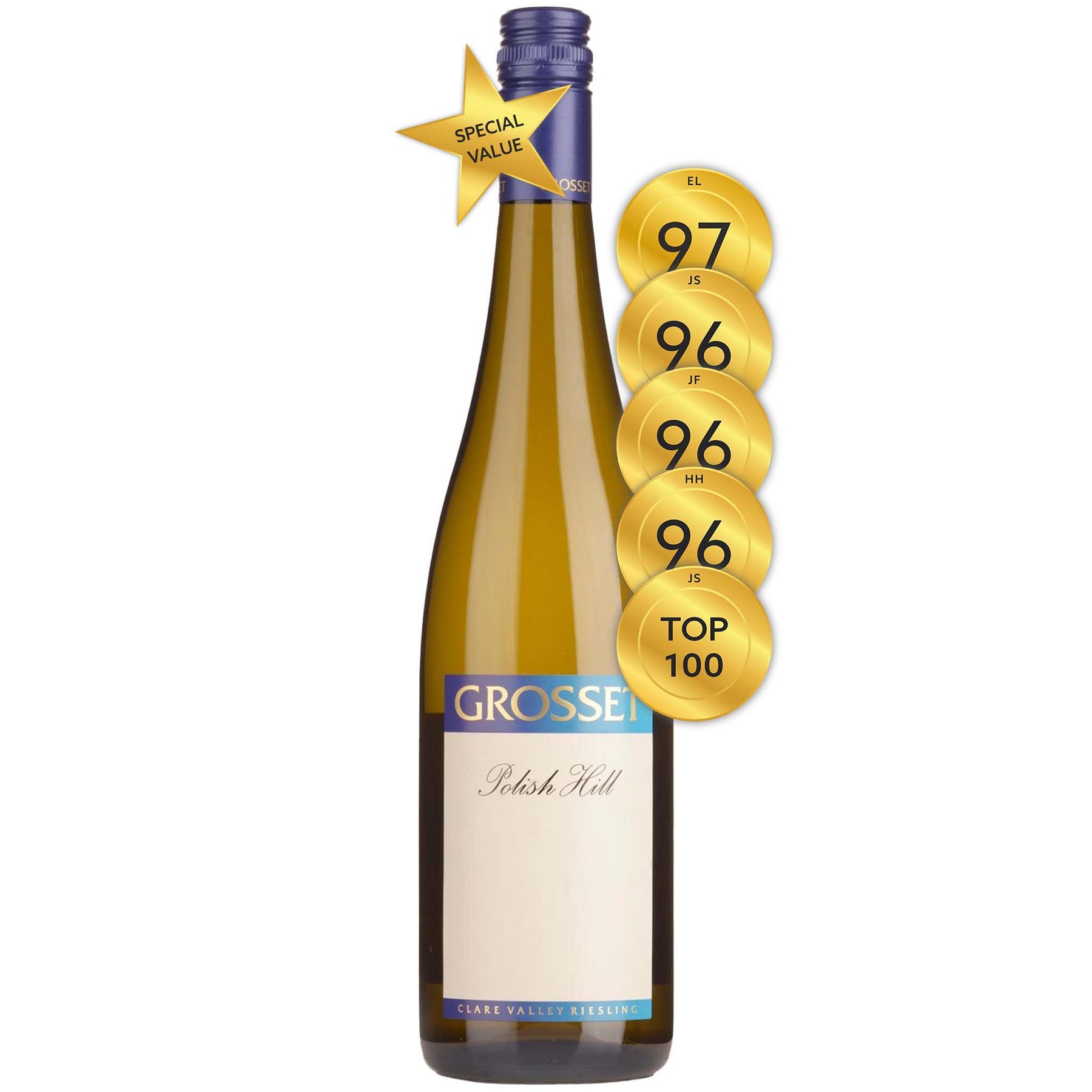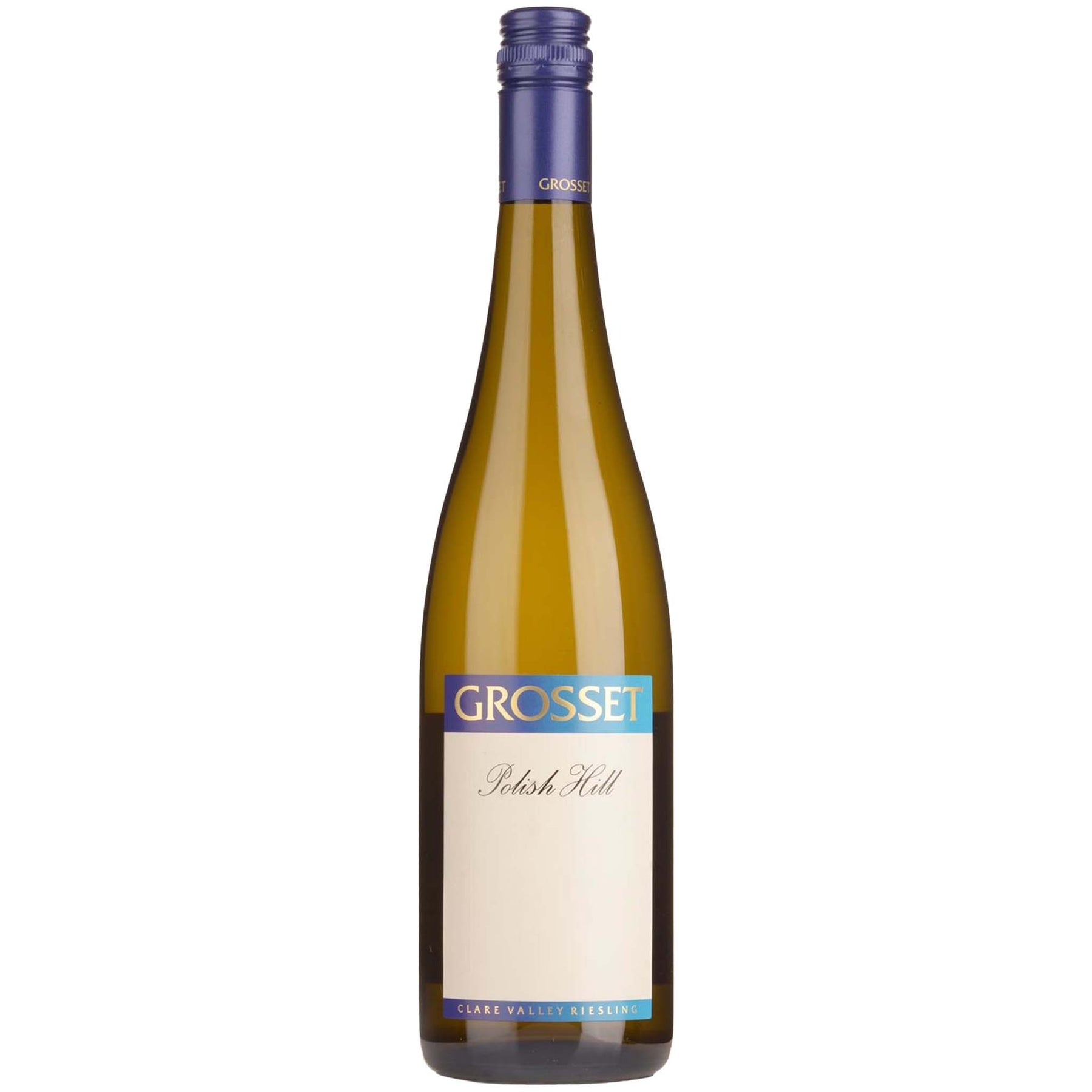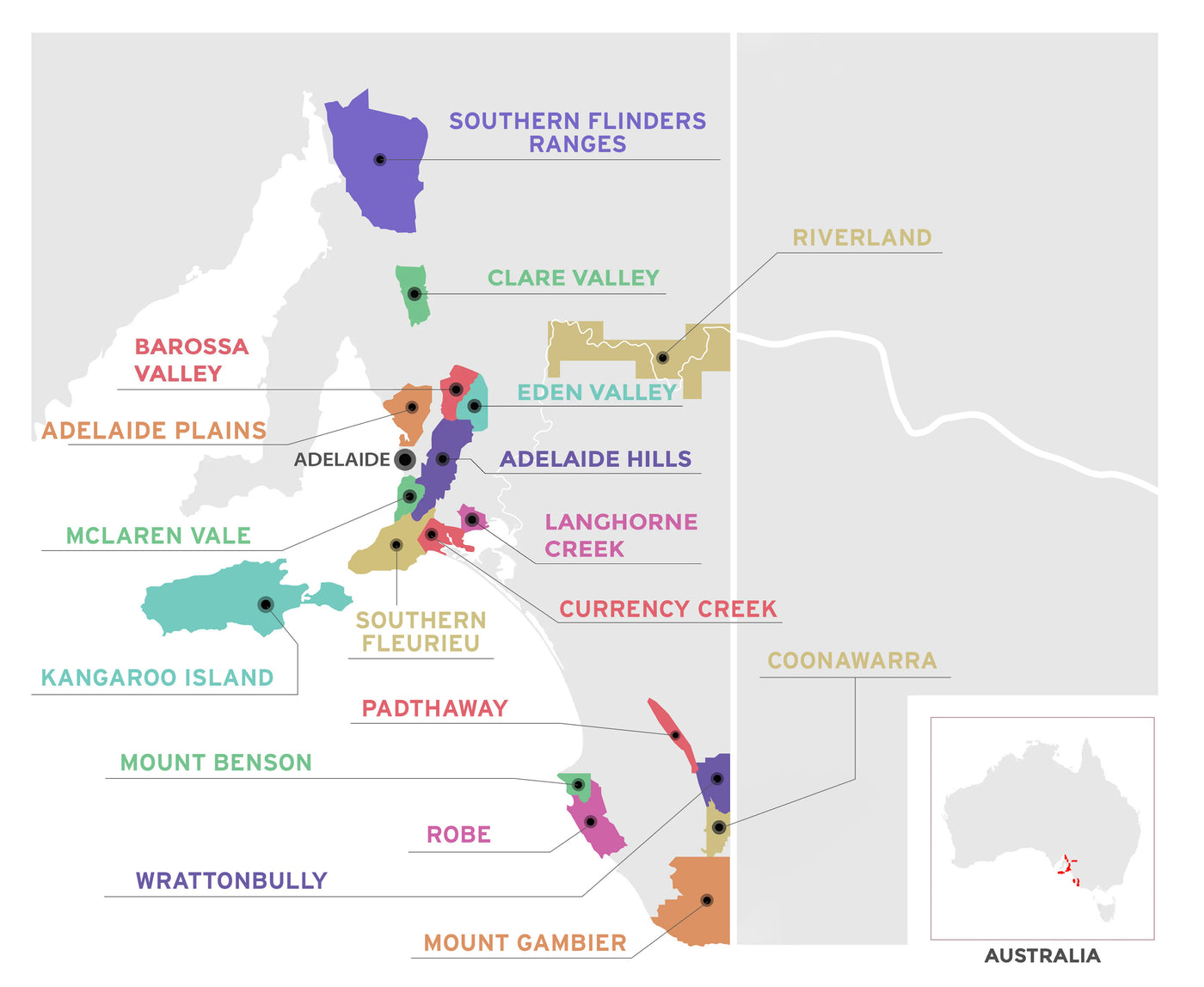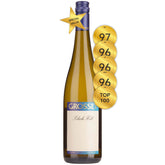

Grosset Polish Hill Riesling 2020
Style: White Wine
Variety: Riesling
Closure: Screwcap
Grosset Polish Hill Riesling 2020
Warehouse
34 Redland Drive
Vermont VIC 3133
Australia
Critic Score: 97
Alcohol: 12.9%
Size: 750 ml
Drink by: 2035
James Suckling Top 100 Wines of Australia 2020
"This long-lived beautifully aromatic and concentrated wine does much to define great Clare Valley Riesling." Andrew Caillard MW
The Grosset Polish Hill Riesling is arguably Australia's best Riesling and one of the New World's greatest Rieslings. For many years it has been a benchmark wine for the Clare Valley. The wine possesses wonderful perfume, incredible fruit purity and intensity of flavour, has great finesse and ages spectacularly. The first vintage of the Grosset Polish Hill Riesling was produced in 1981. Langton's classifies Grosset Polish Hill Riesling as 'Exceptional'. Only 17 wines in total make this grade, of which only 3 are white wines.
"It's very intense in the mouth, showing concentration and drive, the juicy fruit of the fore-palate morphing into a firm, dry back-palate and a long tail. An excellent wine, of superior fruit intensity and persistence. Great cellaring potential." Huon Hooke
"There's an initial shyness on the nose, not surprising given the history of Grosset Polish Hill; and more restrained than some recent releases. This initial restraint gives way to a slowly evolving, yet increasingly intense, pure lime perfume. The palate is tight yet features amazingly intense lime pith and lime juice flavours while the impressive weight and steely backbone are characteristic of the style. It finishes crisp, clean and mouth-puckering: the length is staggering. Ageing Potential: 6-15 years, up to 20 years." Grosset
Expert reviews
"This is a wine that is overlaid on itself: citrus fruit, jasmine florals and pith are draped over white pepper, jasmine tea and sea salt; these layers are fixed to the firm acid and phenolic structure that is the flesh and body of this wine. This is a tightly packed, savoury, serious, searing riesling with authority and gravitas. The length of flavour is something to behold. There is a lightness and a purity in 2020 that confirms life and lift – where the ’19 had a warmth and sunshine in it – this is dappled shade and cool breeze." Erin Larkin, erinlarkin.com.au - 97 points
"Stony and mineral character here with a spicy, wet-stone nose and a wealth of lime and light peach, as well as talcum powder. Chiseled palate with linear acidity and drive. Fresh, long and quite expressive already. Has the potential to improve in bottle as well. Drink or hold." James Suckling, JamesSuckling.com - 96 points and Top 100 Wines of the World 2020
"This wine retains the energy and drive of Polish Hill, yet its fruit concentration and ripeness has softened out any hard edges. It's beautifully fragrant, subtle even, and the palate is long and pure with pith-like texture and excellent length. Lovely drink and ready now. Drink by 2030." Jane Faulkner, Halliday Wine Companion - 96 points and Special Value Wine ★
"Light, bright yellow hue. Reserved, discreet, subtly yeasty aromas, bright and clean and scented with dried flowers. It's very intense in the mouth, showing concentration and drive, the juicy fruit of the fore-palate morphing into a firm, dry back-palate and a long tail. An excellent wine, of superior fruit intensity and persistence. Great cellaring potential. Drink: 2020 to 2035." Huon Hooke, The Real Review - 96 points
Awards
Top 100 Wines of Australia 2020 - James Suckling
Special Value Wine – Halliday Wine Companion ★
Polish hill vineyard
The Grosset Polish Hill Vineyard is an eight‑hectare, organically certified vineyard in the Clare Valley. The vineyard is named after the nearby Hill River Settlement established by Polish immigrants in the 1840s. The vineyard is relatively close-planted and comprises three clones of Riesling, two German and one rare local clone, and produces an average of just two bottles of wine per vine.
Located on a hard rock site at an elevation of 460-480 metres, the gently sloping vineyard sits on silt and shallow shales over a thin crust of clay and gravel, on top of a bed of blue slate estimated to be 500 million years old. The vines struggle to draw nutrients from the soil, so the bunches and berries are small and thick skinned. This vineyard exemplifies how old-rock profiles can contribute to a wine's character.
The vines are dry-grown on a modified ballerina trellising system, and completely hand tended and organically farmed. A major challenge of this site is the variability in vigour from one vine to the next. This demands more intense labour input and hand-tending skill – varied to suit each vine – to achieve balanced vine growth and even fruit ripening. Vintage takes place in early April, normally a few weeks later than the Springvale Vineyard in Watervale.
“The Grosset Polish Hill Riesling has incredible perfume and fruit purity, the lime/floral fruit profile balanced by a fine cut of acidity. This long-lived beautifully aromatic and concentrated wine does much to define great Clare Valley Riesling." Andrew Caillard MW

The four Grosset estate-owned vineyards
About Jeffrey Grosset

"Jeffrey Grosset wears the unchallenged mantle of Australia's foremost riesling maker. Grosset's pre-eminence is recognised both domestically and internationally." James Halliday
Grosset was 15 when his father, an electrician, came home with a bottle of wine and shared it with the family. It was riesling and Jeffrey was gobsmacked. So began the Grosset story. The following year Jeffrey enrolled at Roseworthy Agricultural College, completing an Agriculture degree in 1973 and an Oenology degree in 1975. At the age of 21 Jeffrey started work at Seppelt Great Western, before heading to a German winery with a 1000-tonne crush as assistant winemaker, only to find the chosen French winemaker had changed his mind, leaving Grosset in charge. He subsequently returned to Australia and worked at Lindeman's Karadoc winery with its 30,000-tonne crush. But ultimately he wanted to start his own label.
In 1981 Jeffrey purchased an old milk depot in the historic township of Auburn 1981 and established Grosset Wines. He produced four wines that vintage under his own label, 800 dozen bottles in total. Now, 42 years later, Grosset is regarded as arguably the best maker of riesling in Australia and produces nine wines and 11,000 bottles per vintage.
Grosset is not shy about challenging tradition and questioning accepted practices. In the late 1980s, he was the leader of a successful movement to only allow the use of the word Riesling on Australian wines that were made specifically from the Riesling grape. Until that point, a significant number of Australian wines with Riesling on their label were made from other grape varieties.
Grosset was also the driving force behind a decision in 2000 by Clare Valley Riesling producers to switch to screwcap closures for their wines and to encourage Australian and New Zealand winemakers to do the same, and for the public, retailers and media to embrace the change. He continues to privately fund research into the subject.
Next, he established the Grosset Gaia Fund, donating to charities supporting youth, the arts and the environment. Recently he has led the way for Australian winemakers to use blockchain technology for verification of product provenance, authenticity and seal integrity.
Jeffrey Grosset has received a great deal of local and international recognition for his winemaking. In 1998, he was the first recipient of "Australian Winemaker of the Year" from Gourmet Traveller Wine magazine and was named the "International Riesling Winemaker of the Year" at the Riesling Summit in Hamburg, Germany. He was nominated in 2005 as one of the world's "50 Most Influential Winemakers" by Wine & Spirits and in 2006, named as one of the "Top 10 White Winemakers" in the world by Decanter magazine.
Grosset's philosophy has remained steadfast over the years, the emphasis is on purity of fruit. The estate vineyards, which are ACO certified organic, are hand-tended and each bunch of grapes is harvested at optimum ripeness. The winemaking process is gentle and uncomplicated. With dedication, discipline and the application of knowledge garnered through decades of experience, the result is the finest expression of variety and place.

South Australia
South Australian is responsible for more than half the production of all Australian wine. It is home to more than 900 wineries across 18 wine regions. The regions are Adelaide Hills, Adelaide Plains, Barossa Valley, Clare Valley, Coonawarra, Currency Creek, Eden Valley, Kangaroo Island, Langhorne Creek, McLaren Vale, Mount Benson, Mount Gambier, Padthaway, Riverland, Robe, Southern Fleurieu, Southern Flinders Ranges and Wrattonbully.
Many of the well-known names in the South Australian wine industry established their first vineyards in the late 1830s and early 1840s. The first vines in McLaren Vale were planted at Reynella in 1839 and Penfold's established Magill Estate on the outskirts of Adelaide in 1844.
South Australia has a vast diversity in geography and climate which allows the State to be able to produce a range of grape varieties - from cool climate Riesling in the Clare and Eden Vallies to the big, full bodied Shiraz wines of the Barossa Valley and McLaren Vale. Two of Australia's best-known wines, Penfolds Grange and Henschke Hill of Grace, are produced here. There is much to discover in South Australia for the wine lover.


